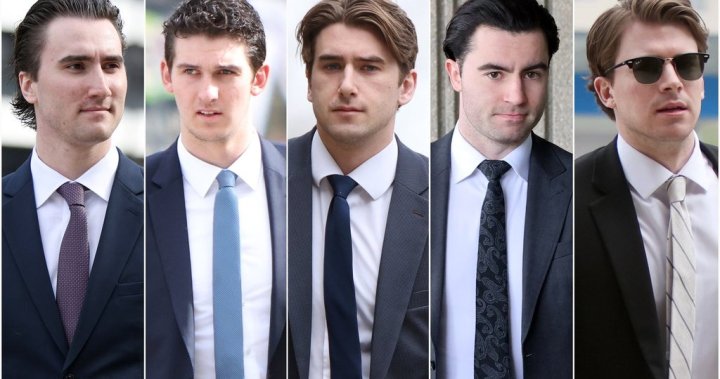A pivotal moment unfolded in a London, Ontario courtroom Thursday as Justice Bruce Thomas ruled that jurors will not hear evidence about the complainant’s past sexual history in the high-profile sexual assault trial involving former NHL first-round draft pick Alex Formenton and four other former World Junior hockey players.
The decision marks a critical development in the case against Formenton, Carter Hart, Michael McLeod, Dillon Dubé, and Cal Foote, who face sexual assault charges stemming from an alleged incident at a London hotel following a Hockey Canada gala in June 2018. All five defendants have pleaded not guilty.
“In sexual assault trials, the complainant’s prior sexual conduct is generally inadmissible to support inferences about consent or credibility,” Justice Thomas stated firmly in his ruling, reinforcing protections established under Section 276 of the Criminal Code, commonly known as the “rape shield” provision.
The ruling came after defense lawyers had filed applications seeking to introduce evidence regarding the complainant’s sexual history, arguing it was relevant to their case. However, the prosecution successfully countered that such evidence would perpetuate harmful myths and stereotypes about sexual assault victims.
Legal experts following the case note that the rape shield law serves a crucial purpose in the justice system. “These provisions exist to prevent a complainant’s sexual history from being used to suggest they were more likely to have consented or are less credible,” explains Toronto-based criminal defense attorney Marilyn Foster, who is not involved in the case.
The trial has drawn intense national attention since it began, highlighting tensions between protecting the rights of complainants in sexual assault cases while ensuring fair trial rights for the accused. The five former hockey players were charged in January 2024 following a lengthy investigation into allegations that resurfaced after the complainant filed a lawsuit against Hockey Canada in 2022.
Hockey Canada faced severe public criticism and lost federal funding after it was revealed the organization had settled the lawsuit using a special fund partly maintained through registration fees. The scandal prompted significant leadership changes within the organization and sparked nationwide discussions about accountability in sports.
The trial continues to navigate complex legal territory, balancing evidentiary standards with evolving societal understanding of sexual assault. Court proceedings have revealed that the complainant alleges she met one of the players at a bar following the Hockey Canada event and subsequently went to a hotel room where the alleged assault by multiple players occurred.
“What makes this case particularly significant is how it intersects with questions of power, celebrity, and accountability in professional sports,” notes Dr. Elena Michaels, a sports sociology professor at the University of Toronto. “The court’s handling of evidence will be closely scrutinized for its broader implications on sexual assault cases involving high-profile individuals.”
As the trial proceeds, it continues to raise important questions about how our justice system handles sexual assault allegations, particularly in cases involving prominent athletes. Will this case ultimately change how sporting organizations approach accountability and player conduct, or will it simply reinforce existing power dynamics in professional sports?

























